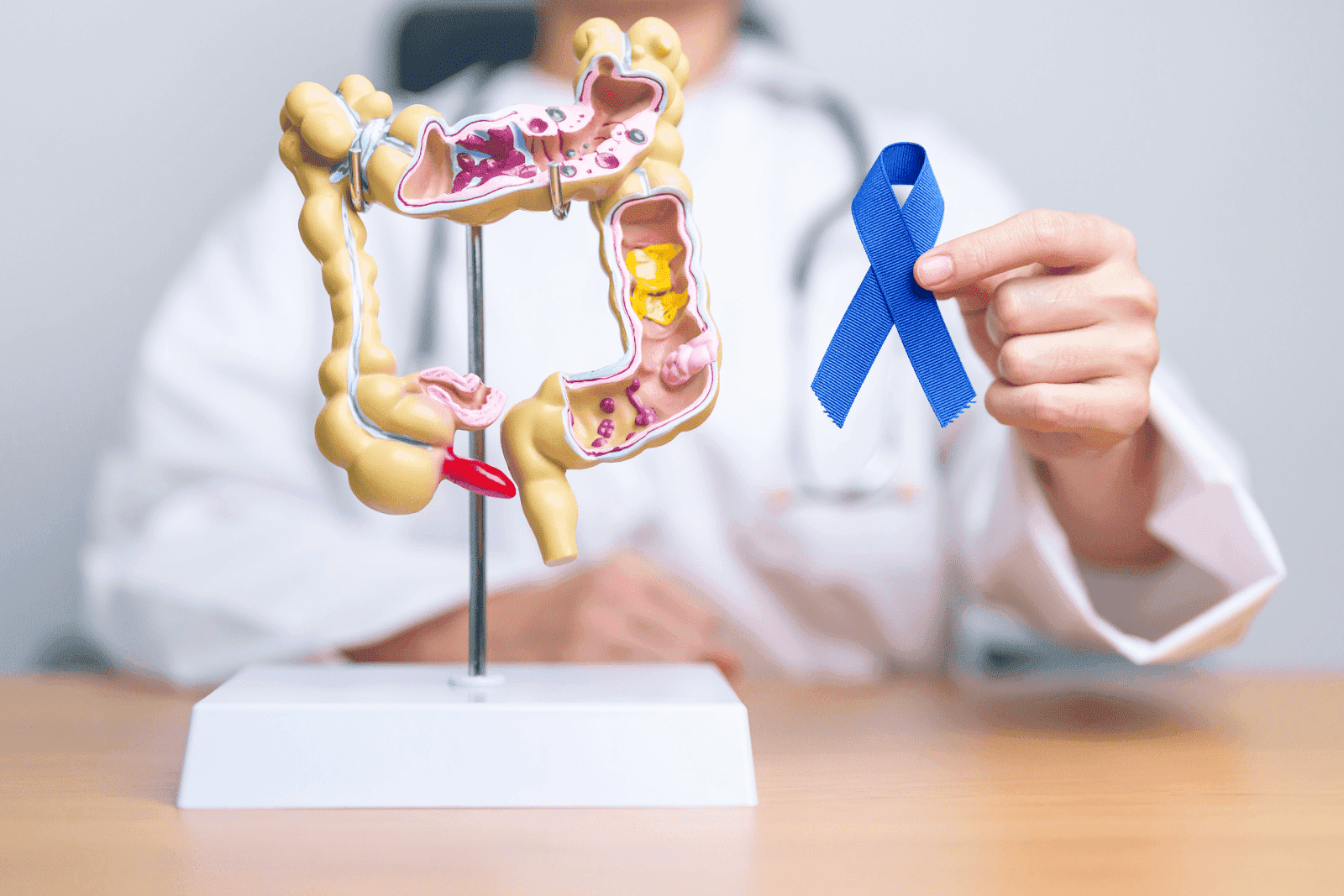Colorectal cancer is one of the most common and potentially serious cancers affecting both men and women worldwide. Early detection is crucial, as it significantly improves treatment outcomes and survival rates. However, many people overlook or misinterpret the symptoms, delaying diagnosis and care. Understanding the warning signs and knowing when to seek medical advice can make all the difference.
Thanks to advances in technology, including innovative AI-powered healthcare services like Doctronic.ai, getting timely and accurate medical guidance has never been easier. This article explores the key symptoms of colorectal cancer, risk factors, and how modern telehealth solutions can support early detection and ongoing care.
 Understanding Colorectal Cancer: What You Need to Know
Understanding Colorectal Cancer: What You Need to Know
Colorectal cancer originates in the colon or rectum, parts of the large intestine that play a vital role in the digestive system. It typically begins as small, benign growths called polyps, which can develop into cancer over time if untreated. The disease can affect anyone, but it is more common in adults over the age of 50.
According to the American Cancer Society, colorectal cancer is the third most commonly diagnosed cancer in both men and women in the United States. In 2024 alone, it is estimated that over 150,000 new cases will be diagnosed, with approximately 53,000 deaths attributed to the disease. These numbers highlight the importance of awareness and proactive health management.
Why Early Detection Matters
When caught early, colorectal cancer is highly treatable, with a five-year survival rate exceeding 90%. Unfortunately, many cases are diagnosed at later stages when symptoms become more pronounced, and treatment options may be limited. Screening tests such as colonoscopies are effective but underutilized, often due to fear, discomfort, or lack of access.
Recognizing symptoms early and consulting a healthcare professional promptly can lead to earlier diagnosis and better outcomes. This is where AI-driven platform Doctronic.ai comes into play, offering fast, reliable, and personalized medical advice to help individuals decide when to seek further evaluation.
In addition to screening, lifestyle choices play a crucial role in reducing the risk of developing colorectal cancer. A diet rich in fruits, vegetables, and whole grains, combined with regular physical activity, can significantly lower the chances of polyp formation and subsequent cancer development. Furthermore, avoiding tobacco and limiting alcohol consumption are essential steps in maintaining overall colorectal health. Educational initiatives and community programs aimed at promoting healthy habits can empower individuals to take charge of their health and make informed decisions.
Moreover, genetic factors can also influence the risk of colorectal cancer. Individuals with a family history of the disease or certain inherited syndromes, such as Lynch syndrome or familial adenomatous polyposis (FAP), should be particularly vigilant about regular screenings and discussions with their healthcare providers. Genetic counseling and testing can provide valuable insights and help in developing personalized prevention strategies, ensuring that those at higher risk receive the appropriate care and monitoring.
Key Symptoms of Colorectal Cancer to Watch For
Colorectal cancer symptoms can be subtle or mistaken for less serious digestive issues. However, certain signs should never be ignored, especially if they persist for more than a few weeks. Below are the most important symptoms to be aware of:
1. Changes in Bowel Habits
One of the earliest signs of colorectal cancer is a noticeable change in bowel movements. This may include:
Diarrhea, constipation, or alternating between the two
Narrow or pencil-thin stools
A feeling of incomplete bowel evacuation
If these changes last for more than a few weeks, it is important to seek medical advice. Persistent bowel habit changes can indicate a blockage or irritation caused by a tumor. It is also worth noting that these changes can be accompanied by other gastrointestinal symptoms, such as bloating or excessive gas, which may further complicate the clinical picture.
2. Blood in the Stool
Blood in the stool is a common symptom of colorectal cancer, but it can also result from other conditions such as hemorrhoids or anal fissures. The blood may appear bright red or dark and tarry, depending on the location of the bleeding within the colon.
Any unexplained rectal bleeding should be evaluated by a healthcare professional promptly. Even small amounts of blood can be significant and warrant further investigation. Additionally, the presence of blood may be accompanied by changes in stool consistency or frequency, which can provide further clues to healthcare providers regarding the underlying issue.
3. Abdominal Discomfort or Pain
Persistent cramps, gas, or abdominal pain may signal colorectal cancer. Tumors can cause blockages or inflammation, leading to discomfort. While occasional stomach upset is common, ongoing or worsening pain should not be ignored. Patients may also experience a sensation of fullness or pressure in the abdomen, which can be particularly distressing and may interfere with daily activities.
4. Unexplained Weight Loss and Fatigue
Sudden and unexplained weight loss, accompanied by fatigue or weakness, can be a sign of many cancers, including colorectal cancer. These symptoms occur as the body’s resources are diverted to fight the disease and due to potential internal bleeding leading to anemia. Individuals may find that they are losing weight despite maintaining a normal diet, which can be alarming and should prompt a medical evaluation.
5. Anemia
Chronic blood loss from the tumor can lead to iron-deficiency anemia, which causes symptoms such as paleness, shortness of breath, dizziness, and fatigue. Anemia may be detected during routine blood tests even before other symptoms become apparent. It is essential to recognize that anemia can also exacerbate feelings of fatigue and weakness, creating a cycle that can significantly impact a person's quality of life.
Furthermore, individuals experiencing these symptoms should also be aware of other potential signs of anemia, such as brittle nails or unusual cravings for non-food items, a condition known as pica. Monitoring these symptoms can provide valuable information to healthcare providers and assist in early detection and intervention.
Who Is at Risk? Understanding the Risk Factors
While anyone can develop colorectal cancer, certain factors increase the likelihood. Being aware of these can help individuals and healthcare providers determine the need for earlier or more frequent screening.
Age and Family History
Age is a significant risk factor, with most cases occurring in people aged 50 and older. However, recent trends show an increase in younger adults diagnosed with colorectal cancer, underscoring the importance of symptom awareness across all age groups.
A family history of colorectal cancer or polyps also raises the risk. Inherited genetic syndromes like Lynch syndrome further increase susceptibility.
Lifestyle Factors
Several lifestyle choices contribute to colorectal cancer risk, including:
Adopting healthier habits can reduce risk and improve overall well-being.
Medical Conditions
Chronic inflammatory bowel diseases such as ulcerative colitis and Crohn’s disease increase the risk of colorectal cancer. Regular monitoring and management of these conditions are essential.
When and How to Seek Medical Advice
Recognizing symptoms is only the first step. Knowing when and how to seek care is equally important. Many people hesitate to consult a doctor due to fear, uncertainty, or inconvenience. Today’s telehealth services provide a convenient and accessible alternative to traditional visits.
The Role of Telehealth in Early Detection
Telehealth platform Doctronic.ai offers innovative solutions for individuals concerned about colorectal cancer symptoms. With AI-powered virtual consultations available 24/7, users can receive immediate, evidence-based medical guidance from the comfort of home.
Doctronic’s AI doctor synthesizes the latest peer-reviewed medical research to provide comprehensive answers and personalized recommendations. This service is especially valuable for those who may not have easy access to in-person care or who want a quick second opinion before scheduling further testing.
 What to Expect During a Medical Evaluation
What to Expect During a Medical Evaluation
If colorectal cancer is suspected, a healthcare provider will typically recommend diagnostic tests such as:
Colonoscopy: The gold standard for detecting polyps and cancer
Fecal occult blood test (FOBT) or fecal immunochemical test (FIT): To detect hidden blood in stool
Imaging studies: CT scans or MRIs to assess tumor spread
Biopsy: To confirm cancer diagnosis
Early consultation can expedite these tests and improve outcomes.
Preventive Measures and Healthy Habits
Prevention is always better than a cure. While not all colorectal cancers can be prevented, many cases can be avoided through lifestyle changes and regular screening.
Screening Recommendations
The American Cancer Society recommends that individuals at average risk begin colorectal cancer screening at age 45. Those with higher risk factors may need to start earlier or undergo more frequent testing.
Screening methods include colonoscopy, stool-based tests, and newer non-invasive options. Discussing these choices with a healthcare provider, or through telehealth services like Doctronic.ai, can help tailor a plan that fits individual needs.
Diet and Exercise
Eating a diet rich in fruits, vegetables, and whole grains while limiting red and processed meats can reduce risk. Regular physical activity and maintaining a healthy weight also contribute to prevention.
Avoiding Tobacco and Limiting Alcohol
Smoking cessation and moderating alcohol intake are important steps in lowering colorectal cancer risk and improving overall health.
The Future of Colorectal Cancer Care: AI and Personalized Medicine
Artificial intelligence is transforming healthcare by enabling faster, smarter, and more personalized care. Doctronic.ai exemplifies this shift by providing an AI doctor that remembers your history, understands your concerns, and draws on the latest medical research to offer tailored advice instantly.
This technology empowers patients to take control of their health, recognize symptoms early, and make informed decisions about seeking care. As colorectal cancer detection and treatment continue to evolve, AI-driven telehealth will play an increasingly vital role in improving outcomes and accessibility.
Colorectal Cancer Awareness Starts Here
Colorectal cancer remains a significant health challenge, but awareness of symptoms and risk factors can lead to earlier detection and better survival rates. Persistent changes in bowel habits, blood in the stool, abdominal pain, unexplained weight loss, and fatigue are critical symptoms that should prompt medical evaluation.
Leveraging modern telehealth platforms like Doctronic.ai offers a convenient, affordable, and reliable way to get immediate medical guidance. With over 10 million users benefiting from Doctronic’s AI-powered primary care, it stands as a trusted resource for those seeking fast, smart, and personalized health advice.
Don’t wait to address your symptoms. Early action can save lives.
Take Control of Your Health with Doctronic
Don't let uncertainty about your symptoms delay your peace of mind. With Doctronic, you get immediate access to the #1 AI Doctor, offering free AI doctor visits and personalized, smart medical advice based on the latest peer-reviewed research. Whether you're concerned about colorectal cancer or have other health questions, Doctronic is here for you 24/7, in all 50 states. Experience the most modern, personal, and convenient care today. Skip the line. Talk to an AI Doctor Now, for free.



 Understanding Colorectal Cancer: What You Need to Know
Understanding Colorectal Cancer: What You Need to Know What to Expect During a Medical Evaluation
What to Expect During a Medical Evaluation